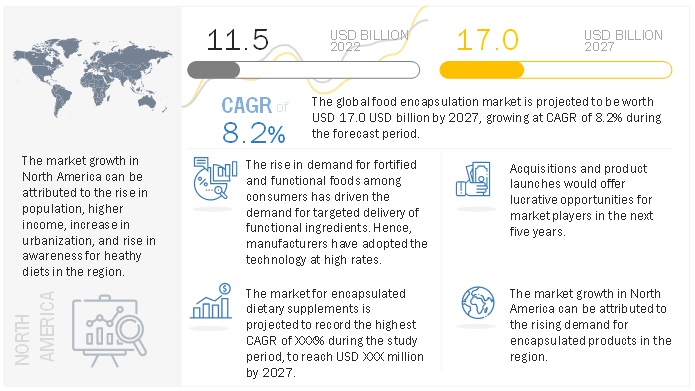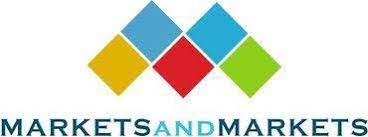The global food encapsulation market was valued at USD 11.5 billion in 2022 and is expected to grow at a compound annual growth rate (CAGR) of 8.2%, reaching USD 17.0 billion by 2027. Food encapsulation involves the process of enclosing a core ingredient, typically a bioactive compound, within a protective wall material. Experts in the industry suggest that the impact of this technology will vary across different food ingredients, with growth potential depending on the type of core phase. The highest adoption of this technology has been seen in vitamins and enzymes, particularly for targeted release in dietary supplements and functional foods, followed by applications in flavors and colors.

The growth of the food encapsulation market is driven by several factors, including the rising consumption of functional foods, the growing demand for convenience foods, and the need for innovative products with natural flavors and clean labels. As a result, there is an increasing demand for raw materials used in food encapsulation.
Food Encapsulation Market Trends
The food encapsulation market is experiencing significant growth, fueled by technological advancements and an increased consumer focus on functional foods and dietary supplements. Key trends include:
Growing Demand for Functional Foods and Nutraceuticals: Consumers’ increasing focus on health and wellness has led to higher demand for functional foods that offer added health benefits like improved digestion, immune support, and enhanced brain function. Encapsulation technology is essential for the effective delivery of active ingredients, such as vitamins, probiotics, and antioxidants, ensuring their stability and controlled release.
Technological Advancements: Innovations such as microencapsulation, nanoencapsulation, and liposomal encapsulation are improving the protection, bioavailability, and controlled release of sensitive ingredients. These advances ensure the stability and effectiveness of active compounds in food products.
Increased Use of Plant-Based Ingredients: With the rise of plant-based diets, encapsulation technology is being used to incorporate plant-derived ingredients, including plant proteins, omega-3s from algae, and herbal extracts, into food products. Encapsulation helps enhance the shelf life and stability of these ingredients.
Personalized Nutrition: Encapsulation technology allows for the controlled release of nutrients based on individual needs, enabling the creation of customized food products such as supplements and functional beverages.
Clean Label Movement: As consumers demand more transparency and natural ingredients, manufacturers are developing encapsulated solutions using non-GMO, organic, and natural materials. This responds to the trend for products with fewer additives and chemicals.
Expansion in the Beverage Industry: The beverage sector is increasingly using encapsulation to fortify drinks with sensitive ingredients like probiotics, vitamins, and minerals, ensuring their protection during manufacturing and effective release in the body.
Focus on Shelf Life and Stability: Encapsulation helps extend the shelf life of products containing sensitive ingredients like probiotics, omega-3 fatty acids, and essential oils, preserving their efficacy over time.
Sustainability Concerns: Growing demand for sustainable practices in food production is pushing the development of eco-friendly encapsulation methods, including the use of biodegradable and plant-based materials to reduce environmental impact.
Download PDF Brochure: https://www.marketsandmarkets.com/pdfdownloadNew.asp?id=68
Market Outlook for Vitamins and Minerals in Food Encapsulation
Vitamins and minerals are expected to see significant growth within the food encapsulation market, especially in superfoods aimed at improving brain and bone health. As consumers become more health-conscious and aware of chronic diseases, the demand for encapsulated vitamins has surged. Encapsulation is critical for preserving vitamins’ stability and preventing oxidation. According to a 2019 article by NutraIngredients, over 40% of the vitamins used in the food industry are encapsulated. However, the adoption of encapsulation technology for minerals remains low, estimated at less than 5%, due to cost and limited benefits.
Robotics in Food Encapsulation
Robotics technology is enhancing the efficiency of food encapsulation, particularly in nutraceutical supplement packaging. Robots improve time efficiency, increase shelf life, and reduce contamination risks, helping manufacturers meet regulatory standards. The rise in demand for nutritional supplements is driving the adoption of robots to optimize large-scale production. Collaborative robots (COBOTs) are also making a significant impact by working alongside human operators to increase productivity and reduce labor costs.
Regional Insights: North America’s Market Dominance
North America leads the food encapsulation market and is projected to grow at a CAGR of 7.8% during the forecast period. Factors such as growing health awareness, a rising focus on nutraceuticals and functional foods, and increasing expenditure on the prevention of chronic diseases contribute to the region’s dominance. The U.S. is expected to remain the largest and fastest-growing market for food encapsulation in North America, driven by technological innovations and the increasing consumption of functional foods.
Leading Food Encapsulation Manufacturers
The global food encapsulation market is dominated by major players like Cargill, BASF SE, Kerry, DSM, Ingredion, Symrise, Sensient, Balchem, and others. These companies are investing in research and development to expand their product portfolios and strengthen their presence in emerging markets. For instance, BASF SE has heavily invested in R&D, with a focus on launching locally tailored products. Similarly, Kerry Group is expanding its taste and nutrition business and investing in innovative technology centers worldwide to capitalize on the demand for encapsulated solutions in the food industry.
BASF SE has a good global presence. The company generates 41% of its revenue from Europe while also targeting other regions. It has been employing effective strategies to gain a considerable market share on the supply front of the food encapsulation market. It has also launched various products specific to local markets in each country. BASF SE continuously invests in R&D; it invested USD 2.38 billion in 2019, enabling the company to provide high-value food-encapsulated products to the food & beverages industry. The company has a strong product portfolio offering products according to the local market demand. The company is expanding its product portfolio and expanding in emerging markets that will fulfil the demand from the food, beverage, and dietary supplement industries in the coming years. It continues to focus on maintaining its market position in the global food encapsulation market through new product launches and geographic expansions in high-growth markets. Owing to huge opportunities in the food encapsulation market, it has expanded its facilities to cater to the growing demand for food encapsulation, thereby enhancing its sales and profitability.
Kerry Group is focused on capitalizing on its nutritional growth platform and expanding its taste and nutrition business globally and regionally to meet customer requirements. It is also focusing on tapping the significant foodservice channel opportunities. Kerry continuously invests efforts into improving its integrated industry-leading technology framework with timely innovation. For premium products, the company has been developing encapsulated flavors in both sweet and savory food products. The company has been focusing on the encapsulation of its flavor ingredients as one of its core processes and plans to expand the application of this technology for other ingredients as well. The company has been investing in its Technology & Innovation centres across the globe, especially in the UAE, South Africa, and Ireland. It focuses on acquisitions and expansion strategies to support taste strategy, nutrition & wellness platforms, and geographic expansion, especially in developing markets. R&D investments, as it currently has announced to develop an innovation centre in Australia, which will help the company strengthen its presence in Australia. The company is focused on increasing its presence in the US through acquisitions and partnerships. Kerry acquired Niacet (US), which would help the growers gain access to Niacet’s high-quality products and make efficient use of the company’s knowledge in preservation.
Request Sample Pages: https://www.marketsandmarkets.com/requestsampleNew.asp?id=68
About MarketsandMarkets™
MarketsandMarketsTM has been recognized as one of America’s best management consulting firms by Forbes, as per their recent report.
MarketsandMarkets™ is a blue ocean alternative in growth consulting and program management, leveraging a man-machine offering to drive supernormal growth for progressive organizations in the B2B space. We have the widest lens on emerging technologies, making us proficient in co-creating supernormal growth for clients.
Earlier this year, we made a formal transformation into one of America’s best management consulting firms as per a survey conducted by Forbes.
The B2B economy is witnessing the emergence of $25 trillion of new revenue streams that are substituting existing revenue streams in this decade alone. We work with clients on growth programs, helping them monetize this $25 trillion opportunity through our service lines – TAM Expansion, Go-to-Market (GTM) Strategy to Execution, Market Share Gain, Account Enablement, and Thought Leadership Marketing.
Built on the ‘GIVE Growth’ principle, we work with several Forbes Global 2000 B2B companies – helping them stay relevant in a disruptive ecosystem. Our insights and strategies are molded by our industry experts, cutting-edge AI-powered Market Intelligence Cloud, and years of research. The KnowledgeStore™ (our Market Intelligence Cloud) integrates our research, facilitates an analysis of interconnections through a set of applications, helping clients look at the entire ecosystem and understand the revenue shifts happening in their industry.
Media Contact
Company Name: MarketsandMarkets™ Research Private Ltd.
Contact Person: Mr. Rohan Salgarkar
Email: Send Email
Phone: 18886006441
Address:1615 South Congress Ave. Suite 103
City: Delray Beach
State: FL 33445
Country: United States
Website: https://www.marketsandmarkets.com/Market-Reports/food-encapsulation-advanced-technologies-and-global-market-68.html
Press Release Distributed by ABNewswire.com
To view the original version on ABNewswire visit: The Future of Food Encapsulation: A Comprehensive Look at Market Dynamics and Forecast
